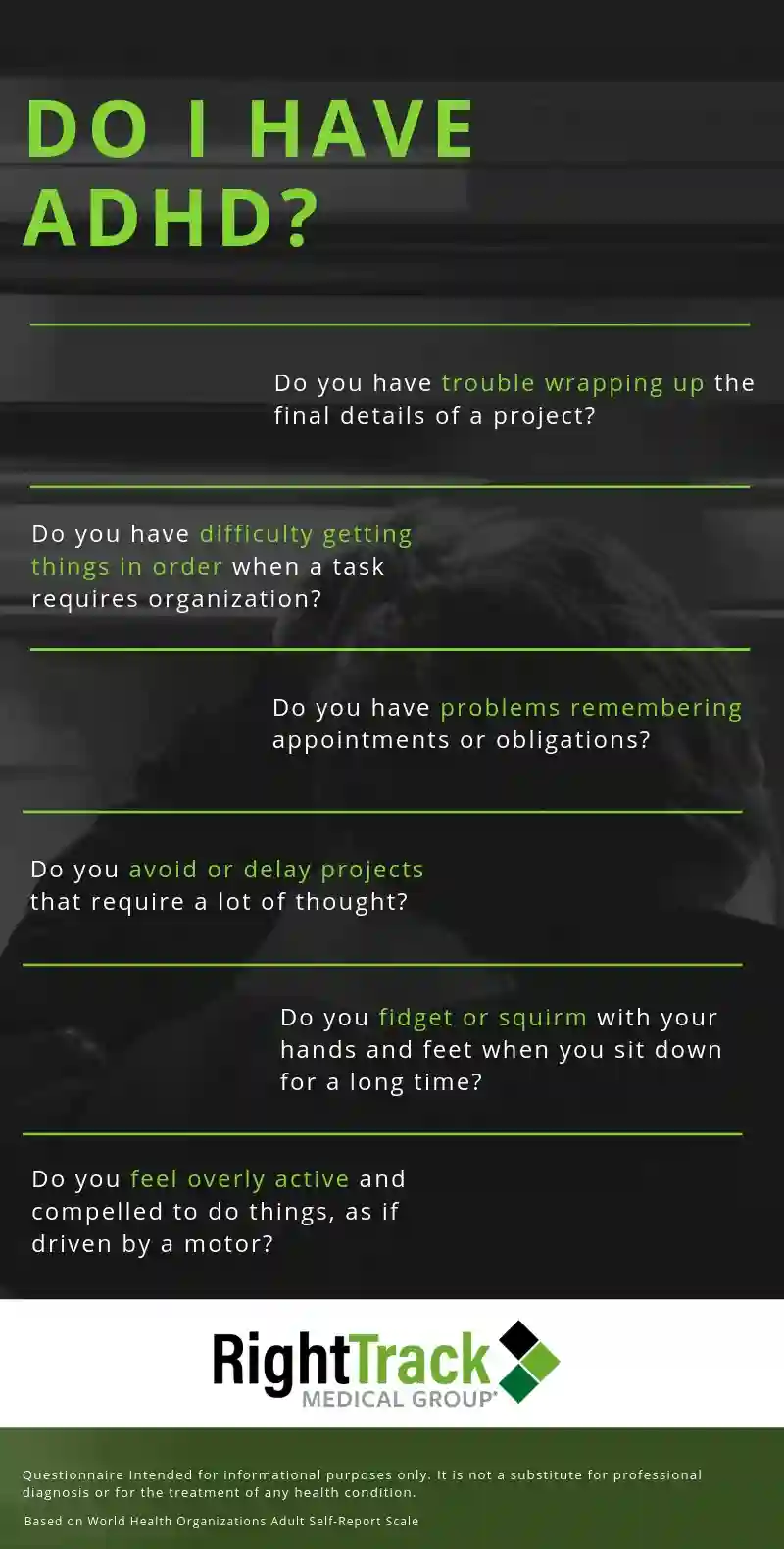All of us struggle to remember everything at all times. From time to time, many of us fail to pay a bill or lose our keys. Yet for some of us, these kinds of struggles are frequent and cause significant disruption.
For these individuals, problems with focus and attention, and remembering things happen constantly. Often, these individuals view this struggle as a personal shortcoming. If they were just more organized, they would be able to cope better with juggling the many balls that are involved in managing life.
Yet, often it’s not a shortcoming at all, but rather a true disorder that affects functioning in multiple areas of life — home, work, school, and relationships.

Attention deficit hyperactivity disorder is a long-lasting disorder characterized by poor attention, hyperactivity, and impulsivity. ADHD usually appears first in childhood, yet adults are also affected by ADHD. An estimated 9 percent of children ages 3 to 17 have ADHD, and 4 percent of adults have ADHD.
ADD is often used to characterize ADHD without the hyperactivity, yet at this time, ADD is no longer a relevant term. ADHD is now the sole terminology used by clinicians, yet it can be specified. For instance, now ADD is referred to as “ADHD, primarily inattentive type.”
Several factors are believed to cause ADHD. Genetics are believed to play a role in ADHD, as one may have a higher risk of developing ADHD if it already runs in their family. In addition, there are certain trends related to brain differences in the part of our brain that affects attention. Also, it is also believed that environmental factors play into the development of ADHD.
The three different types of ADHD include:
ADHD is diagnosed more often in boys than girls. Boys are more likely to have the Hyperactive/Impulsive type of ADHD or the Combined type than the Inattentive type.
Many people can relate to these symptoms from time to time, yet someone with ADHD will experience these symptoms intensely and frequently. For a diagnosis of ADHD, the symptoms must be severe enough to interfere with a person’s day-to-day, overall functioning.

Treatment for adults and children with ADHD is similar in that both often benefit from a combination of medication management and learning to structure their environment. For adults and children alike, it can be beneficial to look at which areas of life are most affected by ADHD. This can serve as a starting focal point for treatment. By working with a mental health professional, both adults and children can be supported with coping strategies in navigating their ADHD, so that their functioning is less impaired and they are able to thrive. In addition, other supports such as a healthy diet, vitamins, and supplements may play a critical role in supporting gains in focus and attention.
If you are an adult who believes you might be dealing with ADHD, it may help to reflect on the degree of the symptoms you are experiencing across various aspects of your life. In considering your professional life, are you performing as well as you are able to? Do you find yourself quitting or losing jobs frequently? Is it especially difficult for you to show up on time and follow through on your tasks until they are completed?
In your personal life, do you have significant difficulty keeping up with bills, chores, and staying organized? If you are facing significant work-life balance adjustments or have a lot of caretaking responsibilities on your plate, you may find yourself answering yes to these questions. Take a minute and consider the severity. Does your forgetfulness and lack of organization seem normal to you and just a minor struggle, or is it severely affecting your life?
Lastly, consider the relational and emotional spheres of your life. Are you experiencing significant stress because you have difficulty focusing or acting impulsively in a way that leads to devastating consequences financially or relationally? Or do you just have too many things going on in your life right now? At times, simplifying your life and your schedule may improve your overall stress experience and your ability to focus on one thing at a time.
While a thorough evaluation is most helpful in determining if you have ADHD, the World Health Organizations Adult Self-Report Scale (ASRS) Screener, adapted below, may be helping as a starting point. It serves as a symptoms checklist rather than a diagnostic tool.

This is a screening measure to help you determine whether you might have ADHD that needs professional attention. This screening tool is not designed to make a diagnosis of ADHD, but to be shared with your primary care physician or mental health professional to inform further conversations about diagnosis and treatment.
Getting a diagnosis for your child can be difficult, in that many of the ADHD symptoms are typical for childhood behavior. Having a lot of energy and difficulty sitting still may be normal for a child, especially a preschool-aged child, and not be ADHD. Therefore, it can be difficult to discern between what is normal and what is ADHD. An intensive and thorough evaluation is necessary to provide this discernment.
Often, your child’s classroom teacher’s voice is insightful, as they observe your child’s focus and attention as well as their peer interactions on a daily basis. It’s also important to rule out other possible causes of symptoms, such as changes in environment, particularly in the home environment, other medical issues, and learning disabilities contributing to problems in school. A diagnosis of childhood ADHD may be given after a child has shown six or more symptoms of inattention and/or hyperactivity on a regular basis for more than six months in at least two settings. Children as young as 4 years old may be diagnosed with ADHD.
In assessing for possible ADHD in your child, you may be asked about the severity of the symptoms. Are the symptoms negatively impacting the life of your child and your own life? You also may be asked about when the symptoms first started and how long the symptoms have been present in your child. Another key part of an evaluation is determining that symptoms are affecting your child across various settings, such as both the school and home environment.
If you believe your child has ADHD, pursue a comprehensive evaluation and focus on early intervention treatment. By proactively treating ADHD, the severity of symptoms should be minimized, leading to your child’s improved functioning across various spheres of life, especially the school environment.
Attention Deficit Disorder Association Adult ADHD Test: https://add.org/adhd-test/
This screening test is a symptom checklist for adult ADHD and not a diagnostic test. It is similar to the one provided in this guide, but it contains more questions that may be helpful for you to consider.
Children and Adults with Attention-Deficit/Hyperactivity Disorder (CHADD): https://chadd.org/
CHADD creates and implements programs and services in response to the needs of adults and families affected by ADHD. Their website provides resources for individuals, families, teachers, other professionals, and organizations.
MedlinePlus.gov ADHD Screening: https://medlineplus.gov/lab-tests/adhd-screening/
This screening may be helpful in identifying if your child has symptoms of ADHD.
NAMI.org ADHD Factsheet: https://www.nami.org/NAMI/media/NAMI-Media/Images/FactSheets/ADHD-FS.pdf
This brief factsheet provided by the National Alliance on Mental Illness contains an overview of the symptoms, causes, diagnosis, and treatment of ADHD.
WebMD.com ADHD in Children: https://www.webmd.com/add-adhd/childhood-adhd/adhd-children#1-Definitely
Information on ADHD in children and options for treatment.
What to know about ADHD: https://www.medicalnewstoday.com/articles/323667.php
Learn more about the characteristics of ADHD and different options for treatment and support.
By Elizabeth Burton, LPC, EdS, NCC for Right Track Medical Group
This article is provided for information only and is not a substitute for diagnosis or treatment by a mental health professional.
We apologize, we have been experiencing technical difficulties the past few days. If you have submitted a request and not heard from us yet, please resubmit now or give us a call.